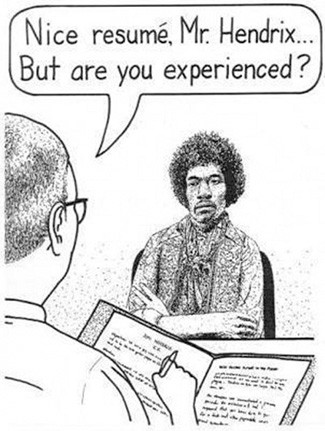I wish I could bring glad tidings on the job front, but alas, no. According to ASNE, 2,600 journalist jobs were lost in 2012 and nothing has improved since. The market is glutted and you are especially at a disadvantage if you’re over age 50. The much-heralded “gig economy” is only real if you have rich parents (universal health care would be a big help). Want to start a blog? You’ll be competing for readers against an estimated 63 million hosted by WordPress alone.
Still, news organizations continue hiring. Back in the day, I became a master of the job interview. This came thanks to my expertise in business journalism, as well as having a reputation as a turn-around specialist for business sections. I learned a thing or three.
It’s always better if the employer comes after you. That puts you at a decided advantage. Even when newspapers were thriving, the resume over the transom rarely led to an interview. This is even more true today. That’s not to say a resume doesn’t matter. It does, and must be professional, laid out well, and show the skills and experience that will make you stand out. Keep it on one page.
It takes a village
Definitely make use of your contacts. They can give you an early heads-up to job openings. You must tend your network, keeping up with friends and former colleagues. Never burn a bridge.
Once you reach the interview stage, remember that you are interviewing the employer as much as they are interviewing you. It used to be that many outfits would send you a week’s worth of newspapers and even ask for a critique. Now, thanks to the Internet, there’s never an excuse to not know the history, reputation, content, focus, strengths and places to improve for any potential workplace.
Be prepared to answer the usual questions: your strengths, weaknesses (find the language to make them seem like hidden strengths — I was always “very driven”), important lessons you’ve learned, etc. Say that you are constantly learning, continuously updating your stills. Give examples of your flexibility. And have the chops to back it up. Flatter them, but be honest and specific. On the other hand, don’t go overboard in being critical. That stupid story might have been a pet idea of the person interviewing you.
You may be asked, “What’s your biggest pet peeve” or words to that effect. Answer honestly but don’t come off as a complainer. At a very good newspaper, I was asked that by the executive editor. I answered, “A liar.” An uncomfortable silence followed. (They still offered me the job).
Newspapers where I interviewed put me through an intense couple of days meeting people at all levels. Knight Ridder was especially rigorous. It was a stimulating, exhausting but most useful exercise. Your goal should be to speak with editors, reporters and visual and multimedia journalists at all levels. Each can give a different perspective.
These two questions
Ask two important questions of everyone you can. First, what are the characteristics of the people who succeed here? Second, what are the unspoken (hidden, but don’t put it that way) rules, norms and issues? The answers to both these questions will tell you much about whether you want to work there, your chances for success and the hidden culture.
Also ask about the expectations for the job. Seek out as specific a set of answers as you can get. Find out what happened to the person who vacated the job you are applying for. What is the vibe you pick up?

If you are bringing a specialty, seek out the level of understanding and support you are likely to find. For example, as a turnaround artist I knew that every bad business section existed for reasons that ran all the way to the top. I was very blunt in wanting to know if they really wanted change. As Sean Connery’s character tells Elliot Ness (Kevin Costner) in The Untouchables, “You said you wanted to get Capone. Do you really wanna get him? You see what I’m saying is, what are you prepared to do?…If you open the can on these worms you must be prepared to go all the way.”
If you receive murky answers to all these, beware. These are major red flags.
Trying to find the right fit
Find other people who have worked at the target news org and find out what they have to say.
You especially want to know if they “get” and value business journalism. Will you have the support to succeed and grow? If it is a newsroom dominated by a metro-centric culture where business news is seen as a dead-end, beware.
Be a very good listener, not just to the answers but to the questions. These, too, can give you valuable insights. Nailing the interview requires a good deal of emotional intelligence and blarney. The more you interview, the better you become, the more relaxed and comfortable talking about yourself. Talking just enough but not too much
On both sides of the desk, each party should be looking for the right fit. Any decent news manager only brings in people who already have top skills and experience. But in the wrong kind of job, an otherwise excellent journalist can fail.
Afterwards, send a hand-written thank you note to everyone you talked with. The little things do matter. When I was a section head, I sometimes kept in touch with promising candidates for years, even if I couldn’t offer them that job. Sometimes I could come back later with another job.
In today’s environment, it is also critical to discreetly find out the viability of the potential employer. Don’t take a job that will only last three months before the Titanic sinks.
Even in our time of professional trial, I want to believe these ground rules are still valuable. And they translate to the situation if you are forced out of out calling, to any job you might go for.











